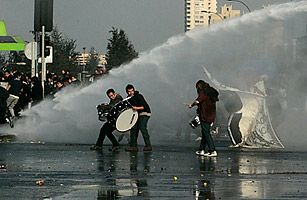
For more than two weeks, students have occupied the main campus of the University of Chile in Santiago, spreading sleeping bags across office floors between empty soda cans brimming with cigarette butts. On one chilly afternoon “There is a demand for structural change in Chilean society that hasn’t occurred in 20 years,” says pollster and political analyst Marta Lagos.
But on no issue does that demand seem more intense than education – which could be key to whether Chile stays the region’s most developed nation in the long run. This month’s march in Santiago by more than 80,000 students and teachers, who want increased state participation in education, was the largest the country has seen since its brutal right-wing military dictator, the late Gen. Augusto Pinochet, stepped down in 1990. Across Chile, hundreds of thousands of students have occupied highs schools and shut down universities like U of Chile. The school’s student federation president, Camila Vallejo, recently met with Education Minister Joaqun Lavn, but she’s pessimistic about a resolution. “The education crisis requires the participation of all citizens,” says Vallejo, “but the minister is not interested in that sort of debate.”
The trouble stems, ironically, from Pinochet’s attempt in the 1980s to narrow the education gap between rich and poor. His answer was decentralization and school voucher-style privatization, the remedy of the conservative “Chicago School” of economics he embraced. But instead of leveling the playing field, say critics, the policy solidified inequalities. For one thing, the public education onus was thrust on local governments, meaning kids from wealthier municipalities got an even bigger leg up on poor students, for whom the voucher system never really worked. The more affluent youths, meanwhile, disproportionately secure admission to the best universities and win a far greater share of government scholarships.
The policy also resulted in an explosion of private universities — which receive state funds because, despite their profitability, they’re designated as “non-profit organizations.” Many are of dubious quality, meaning for the past three decades money has been siphoned from Chile’s more renowned state universities for lesser private institutions. Educators and students had hoped the center-left governments that followed Pinochet, and Piera’s moderate conservative administration, would rectify that situation and increase funding for state schools. Now they’ve taken their frustration to the streets. “A lot of people bet on Piera, thinking our problems were because of the [failure of the center-left governments],” says Rodrigo Toro, a U of Chile architecture professor who has been working in a conference room a block from his office since students took over his department. “Now they realize that nothing has changed and they’ve had enough.”
Eager to put an end to those demonstrations, including some that have called for his resignation, Lavn last week did bring deans and student leaders to the negotiating table. He offered a $75 million revitalization fund for state universities, but it was largely rejected as insufficient. In the meantime, U of Chile has had to pass on its increasing financial burden to its students. One result: Chilean families now finance 73% of higher education, compared to an average 16% for other members of the Paris-based club of developed nations, the Organization for Economic Cooperation and Development , to which Chile was recently admitted.
As Piera watches his poll numbers drop like a rock down a mine shaft, he’s learning what his pragmatic socialist predecessor, Michelle Bachelet, discovered: governing from the center, despite all the warm-and-fuzzy visions of bringing a polarized society like Chile together, is tough. Bachelet herself faced angry student protests five years ago, known as the “Penguin Revolution” , which focused on secondary school inequities. She failed to resolve the festering education problem, however, and Piera doesn’t seem to have learned much from her experience.
Lagos points out that any President would find it hard to deal with the current wave of discontent — precisely because, since Chile is more developed than most Latin American countries, the expectations bar is higher. “It’s just bad luck for Piera and the right that it’s happening now,” she says. Still, Lagos notes, “Piera was elected on change and he’s not changing the things people wanted changed, so these protests aren’t going away. If anything, they’re going to crescendo.”
The good news for Piera is that he has three years left in his four-year term to turn the tide. He’s begun that effort by promising to crack down on a business scandal sending shockwaves through the country, in which La Polar, one of Chile’s largest retailers, has confessed to renegotiating credit for thousands of customers, without their permission, in an effort to conceal massive debts. Otherwise, it was announced this month that Hollywood actor Eric Roberts will play Piera in an upcoming movie on the miners rescue — a reminder of the kind of adulation the President likely can’t wait to see up on the silver screen.
See pictures of the destruction after Chile’s massive earthquake in 2010.See why Chile’s Atacama Desert attracts wealthy tourists.